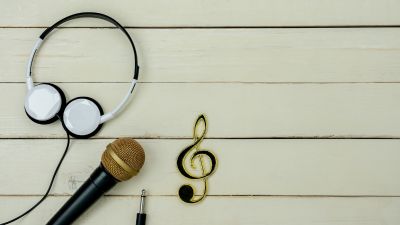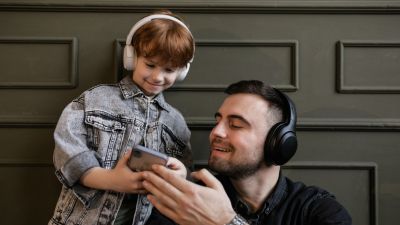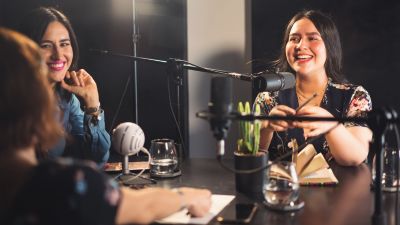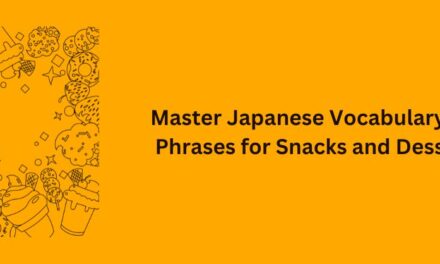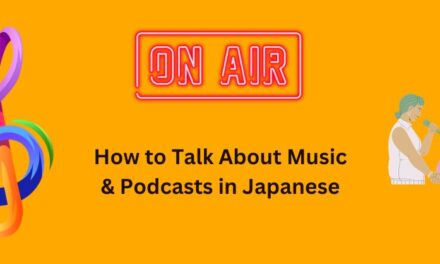How to Talk About Music & Podcasts in Japanese
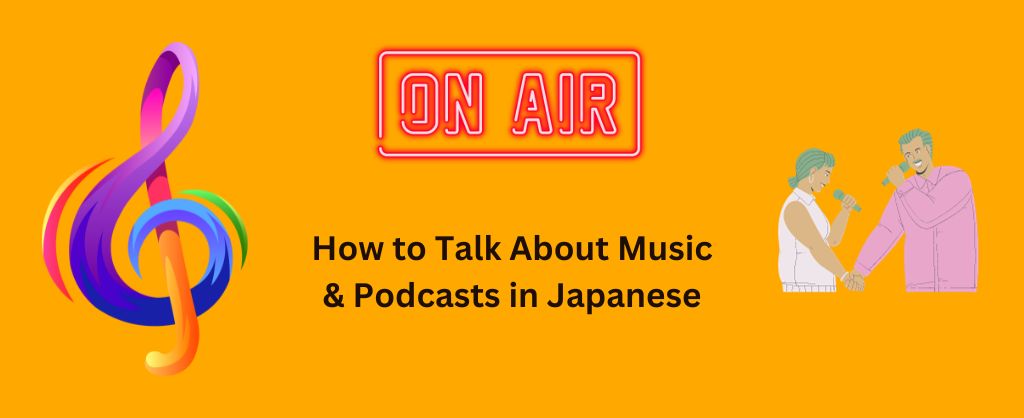
Register For the Online Japanese Event
Music and podcasts are a great way to immerse yourself in the Japanese language. By listening to Japanese music and podcasts, you can pick up new vocabulary, improve your listening comprehension, and learn more about Japanese culture.
In this article, we’ll go over some key vocabulary words and phrases to help you discuss music and podcasts in Japanese.
Topics covered in this article:
- Discussing Musical Genres
- Talking About Musical Artists, Songs and Albums
- Talking About Playing & Listening to Music
- Talking About Podcasts
- Phrases to Use during a Japanese Conversation
Discussing Musical Genres
Here are some common genres of Japanese music and how to say them in Japanese:
- Pop music – ポップミュージック (poppu myūjikku)
- Rock music – ロック (rokku)
- Hip hop/Rap – ヒップホップ (hippu hoppu)
- Jazz – ジャズ (jazu)
- Enka – エンカ (enka) – a popular ballad style
- Anime/Game music – アニメ/ゲームミュージック (anime/gēmu myūjikku)
- Traditional Japanese music – 邦楽 (hōgaku)
Japanese Vocabulary for Holidays, Vacations and Weekends
Some example sentences using these genres:
- 私はJ-POPが好きです。 (Watashi wa J-POP ga suki desu.) – I like J-Pop.
- クラシック音楽をよく聴きます。(Kurashikku ongaku o yoku kikimasu.) – I often listen to classical music.
- 高校生の時、ヒップホップに夢中でした。(Kōkōsei no toki, hippu hoppu ni muchū deshita.) – I was obsessed with hip hop in high school.
Talking About Music Genres and History
To discuss musical genres and history in Japanese, here are some useful terms:
- Classical music – クラシック音楽 (kurashikku ongaku)
- Folk music – フォーク (fōku)
- Enka ballad – エンカバラード (enka barādo)
- Kayokyoku pop – 歌謡曲 (kayōkyoku)
- J-pop – Jポップ (J-poppu)
- Visual kei – ヴィジュアル系 (vijuaru-kei)
- Idol music – アイドル歌謡曲 (aidoru kayōkyoku)
- Traditional music – 邦楽 (hōgaku)
- 1920s/30s music – 20年代/30年代の音楽 (nijū-nendai/sanjū-nendai no ongaku)
- Showa era music – 昭和の歌謡曲 (Shōwa no kayōkyoku)
- Contemporary music – 現代音楽 (gendai ongaku)
Some examples:
- 日本の歌謡曲の歴史は、1920年代のジャズやブルースから始まった。(Nihon no kayōkyoku no rekishi wa, nijū-nendai no jazu ya burūsu kara hajimatta.) – The history of Japanese pop music started in the 1920s with jazz and blues.
- ヴィジュアル系は1980年代後半に登場したロック音楽のジャンルだ。(Vijuaru-kei wa hachijū-nendai kōhan ni tōjō shita rokku ongaku no janru da.) – Visual kei is a rock music genre that emerged in the late 1980s.
- アイドル歌謡は今でもなお日本の音楽シーンで人気がある。(Aidoru kayō wa ima demo na o nihon no ongaku shīn de ninki ga aru.) – Idol pop music still remains popular in the Japanese music scene today.
Talking About Musical Artists
When talking about musical artists in Japanese, use these terms:
- Singer – 歌手 (kashu)
- Band – バンド (bando)
- Group – グループ (gurūpu)
- Solo artist – ソロアーティスト (soroātisuto)
You can refer to musical artists using their name + は (wa) or の (no). For example:
- 私はRADWIMPSが大好きです。(Watashi wa RADWIMPS ga daisuki desu.) – I love RADWIMPS.
- Perfumeのコンサートに行きたいです。 (Perfume no konsāto ni ikitai desu.) – I want to go to a Perfume concert.
To say you like a certain artist, use 好き (suki):
- Aimerの歌が好きだ。(Aimer no uta ga suki da.) – I like Aimer’s songs.
Talking About Songs and Albums
Here’s key vocabulary for discussing songs and albums in Japanese:
- Song – 歌 (uta)
- Album – アルバム (arubamu)
- Single – シングル (shinguru)
- Lyrics – 歌詞 (kashi)
- Melody – メロディー (merodī)
- Track – トラック (torakku)
You can refer to songs and albums using の:
- 龍飛御風の新しいアルバムがあるの? (Ryuufuu no kaze no atarashii arubamu ga aru no?) – Is there a new album from Ryuufuu no kaze?
To say you like a certain song, you can use 好き (suki):
- スピッツの「チェリー」が好きなんだ。(Supittsu no “Cherī” ga suki nanda.) – I like Spitz’s song “Cherry”.
Talking About Listening to Music
Use these words and phrases to talk about listening to music in Japanese:
- Listen to – 聴く (kiku)
- Listen again – もう一度聴く (mōichido kiku)
- Listen closely – よく聴く (yoku kiku)
- Can’t hear well – よく聞こえない (yoku kikoenai)
- Hear a sound/voice – 音/声が聞こえる (oto/koe ga kikoeru)
- Listen on repeat – 繰り返し聴く (kurikaeshi kiku)
- In the background – バックグラウンドで (bakkuguraundo de)
- Loudly – 大きな音で (ōkina oto de)
- Through headphones – ヘッドホンで (heddofon de)
Some examples:
- 音楽を聴きながら勉強している。(Ongaku o kiite benkyō shite iru.) – I’m studying while listening to music.
- もっと大きな音でその曲を聴かせて。(Motto ōkina oto de sono kyoku o kikasete.) – Let me listen to that song louder.
- イヤホンで Playlist を聴いている。(Iyahon de pureisuto o kiite iru.) – I’m listening to a playlist with earphones.
Talking About Music You Like
Use these words and phrases to discuss music you like in Japanese:
- I like (name/type of music) – (music)が好きだ (…ga suki da)
- My favorite song is… – 一番好きな曲は… (ichiban suki na kyoku wa…)
- I often/sometimes listen to… – よく/時々…を聴く (yoku/tokidoki…o kiku)
- I’m into…music these days – 最近は…音楽にハマっている (saikin wa… ongaku ni hamatte iru)
- I love singing along to… – …と一緒に歌うのが大好きだ(…to issho ni utau no ga daisuki da)
- This band’s songs are great – このバンドの曲は最高だ (kono bando no kyoku wa saikō da)
Some examples:
- 私は邦楽が好きで、RADWIMPSとコブクロをよく聴きます。(Watashi wa hōgaku ga suki de, RADWIMPS to Kobukuro o yoku kikimasu.) – I like Japanese music, and often listen to RADWIMPS and Kobukuro.
- 一番好きな曲は Perfume の「Laser Beam」です。(Ichiban suki na kyoku wa Perfume no “Laser Beam” desu.) – My favorite song is Perfume’s “Laser Beam”.
- 最近では Aimer の曲にハマっている。(Saikin de wa Aimer no kyoku ni hamatte iru.) – I’m into Aimer’s songs these days.
Talking About Playing Music
Here’s vocabulary for talking about playing music yourself in Japanese:
- Play music – 楽器を演奏する (gakki o ensō suru)
- Play the piano – ピアノを弾く (piano o hiku)
- Play the guitar – ギターを弾く (gitā o hiku)
- Play the violin – バイオリンを弾く (baiorin o hiku)
- Play the drums – ドラムを演奏する (doramu o ensō suru)
- Form a band – バンドを組む (bando o kumu)
- Perform on stage – ステージでパフォーマンスする (sutēji de pafoomansu suru)
- Be in tune/out of tune – 調子が良い/悪い (chōshi ga ii/warui)
Some examples:
- 中学生の時、吹奏楽部でトロンボーンを吹いていました。(Chūgakusei no toki, suisōgaku-bu de toronbōn o fuite imashita.) – I played the trombone in a wind ensemble in middle school.
- 毎日1時間ぐらいピアノの練習をしています。(Maibe ichi-jikan gurai piano no renshū o shite imasu.) – I practice the piano for around one hour every day.
- 高校の文化祭でみんなの前でギターを弾きたい。(Kōkō no bunkasai de minna no mae de gitā o hikitai.) – I want to play guitar in front of everyone at the school culture festival.
Talking About Podcasts
Here’s some handy vocabulary for talking about podcasts in Japanese:
- Podcast – ポッドキャスト (podokyasuto)
- Episode – エピソード (episōdo)
- Host – ホスト (hosuto)
- Listen to podcasts – ポッドキャストを聴く (podokyasuto o kiku)
- Download podcasts – ポッドキャストをダウンロードする (podokyasuto o daunrōdo suru)
- Subscribe – 購読する (kōdoku suru)
- Podcast app – ポッドキャストアプリ (podokyasuto apuri)
- Recommend a podcast – ポッドキャストを勧める (podokyasuto o susumeru)
Some examples:
- 毎朝、通勤電車の中でニュースのポッドキャストを聴いている。 (Maiasa, tsūkin-densha no naka de nyūsu no podokyasuto o kiite iru.) – I listen to news podcasts every morning on my commute.
- この英会話のポッドキャストは発音練習に最適だと思う。(Kono eikaiwa no podokyasuto wa hatsuon renshū ni saiteki da to omou.) – I think this English conversation podcast is perfect for pronunciation practice.
- あの YouTuber のポッドキャストは面白いので購読した。(Ano yūtubā no podokyasuto wa omoshiroi node kōdoku shita.) – I subscribed to that YouTuber’s podcast because it’s funny.
Phrases to Use during a Japanese Conversation
一番好きな歌か曲を教えてください。- Ichiban suki na uta ka kyoku o oshiete kudasai. – Share your favorite song or piece of music.
どんな音楽が好きですか?- Donna ongaku ga suki desu ka? – What kind of music do you like?
どのジャンルが好きですか?- Dono jannru ga suki desu ka? – What kind of genre do you like?
どんな時に音楽を聴きますか?- Donna toki ni ongaku o kikimasu? – When do you like to listen to music?
日本の音楽は好きですか?どの歌手かグループが好きですか?- Nihon no ongaku wa sukidesuka? Dono kashu ka guruupu ga suki desuka? – Do you like Japanese music? Which singer or group do you like?
日本の伝統的な音楽を聞いたことがありますか?- Nihon no dentouteki na ongaku o kiita koto ga arimasuka? – Have you heard Japanese traditional music?
あなたの国にはどんな音楽がありますか?- Anata no kuni ni wa donna ongaku ga arimasu ka? – What kinds of music are there in your country?
歌詞とメロディーとどっちが大事ですか?- Kashi to merodii to docchi ga daiji desuka? – Are the lyrics or melody more important?
ライブに行ったりしますか?- Raibu ni ittari shimasu ka? – Do you like to go to live events?
どうやって音楽を聴きますか?(スピーカー、イアフォン、ヘッドフォン、etc.) – Douyatte ongaku o kikimasu? (supiikaa, iafon, heddofon) – How do you listen to music? (speaker, earphone, headphone, etc.)
レコードやCDを買ったりしますか?- Rekoodo ya CD o kattari shimasuka? – Do you buy records or CD’s?
音楽のストリーミングサービスを使っていますか?- Ongaku no sutoriimingu saabisu o tsukatte imasuka? – Do you use a music streaming service?
遅い曲と速い曲どっちが好きですか?- Osoi kyoku to hayai kyoku docchi ga sukidesuka? – Do you prefer slow music or fast music?
ラジオで音楽を聞きますか?- Rajio de ongaku o kikimasuka? – Do you listen to music on the radio?
ポッドキャストを聞きますか?- Poddo kyasuto o kikimasuka? – Do you listen to podcasts? (share your favorite ones!)
どんな時音楽を聞きますか?- Donna toki ongaku o kikimasuka? – When do you listen to music?
古い音楽と新しい音楽とどっちが好きですか?- Furui ongaku to atarashii ongaku docchi ga suki desuka? – Do you prefer old music or new music?
一番好きな歌手は誰ですか?- Ichiban suki na kashu wa dare desuka? – Who’s your favorite singer?
楽器が弾けますか?- Gakki ga hikemasuka? – Do you play an instrument?
歌を歌うのは好きですか?- Uta o utau no wa suki desuka? – Do you like to sing songs?
Conclusion
Listening to Japanese music and podcasts is a fun way to pick up new vocabulary while immersing yourself in the language.
Use the phrases we learned to talk about your favorite artists and songs, discuss musical genres and history, and recommend great podcasts to your Japanese friends. Don’t be afraid to speak up – your listening skills will improve with practice!
So grab your headphones, search for some new Japanese music and podcasts, and start listening.

